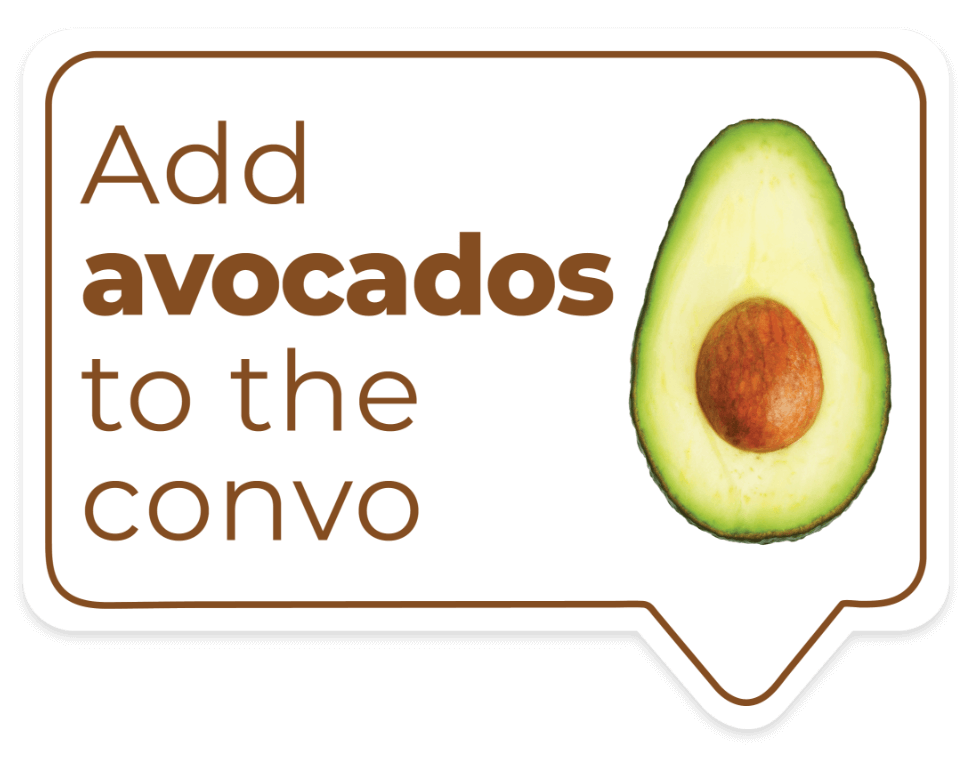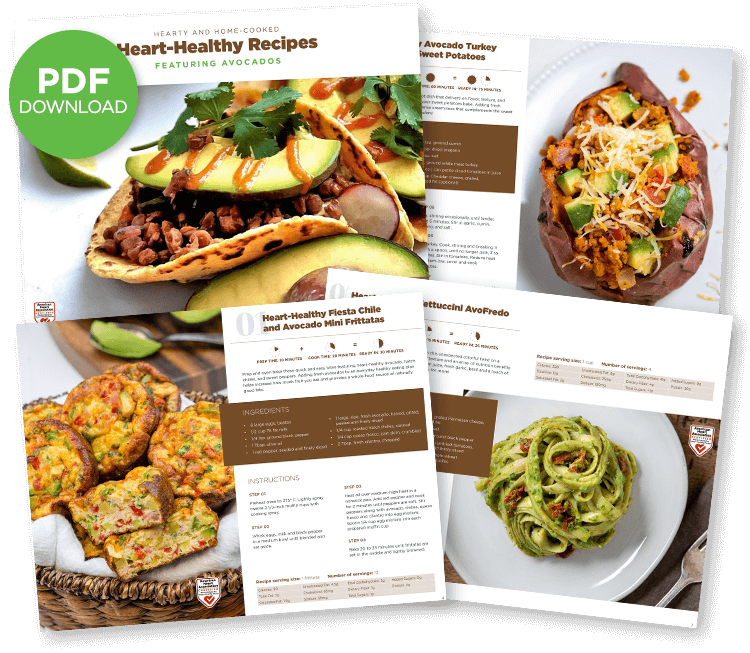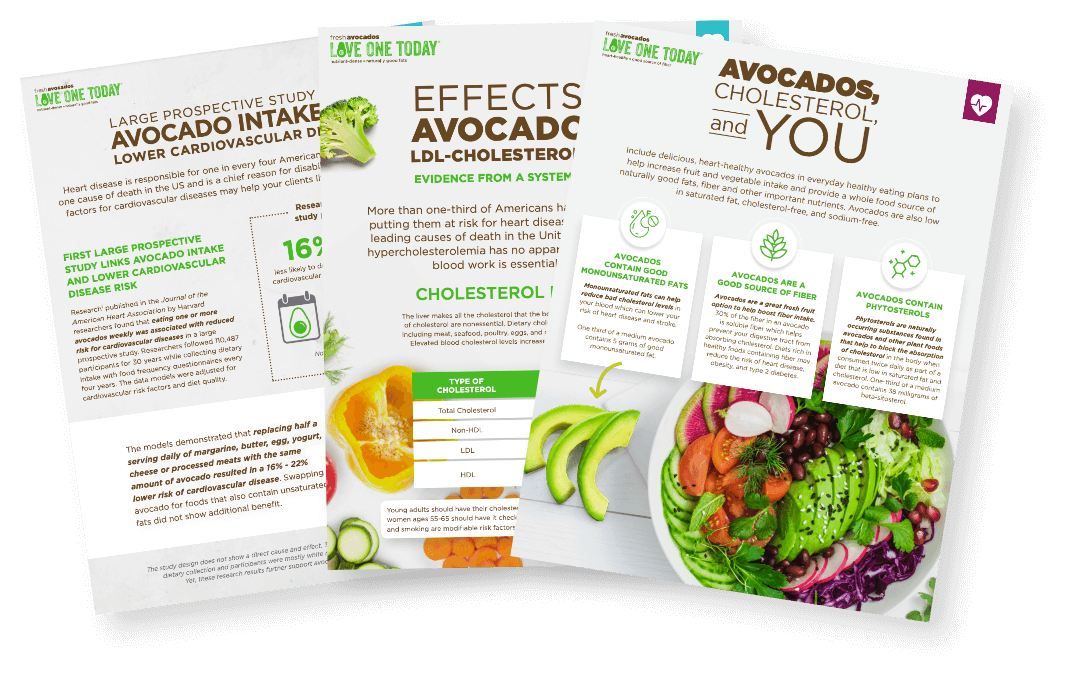
Higher HDL cholesterol was among the outcomes associated with avocado consumption.1
Study Explores Role of Avocado Consumption in Cardiometabolic Risk Measures
Research Summary
- Avocado consumers exhibited higher HDL cholesterol levels and lower plasma glucose levels, BMI and waist circumference compared to non-consumers.
- A trend toward lower plasma glucose, HbA1c and higher dietary fiber intake was found between high and low avocado consumers.
In the study of 2,736 Australian adults, researchers used dietary recall data to examine the relationship between avocado consumption and cardiometabolic risk measures. On average, participants had a daily avocado intake of 25 grams. It’s important to note that the study, funded by the Avocado Nutrition Center, can establish associations but not causation. Nevertheless, these findings contribute to evidence suggesting that avocados are heart-healthy and may benefit a diabetes-friendly diet.
Higher HDL cholesterol levels contribute to a healthier cardiovascular profile. Learn more about the growing body of research on avocados and heart health by downloading the fact sheet.

Heart Health Mini Cookbook: Avocado-Inspired Recipes
 Featuring American Heart- Association Heart-Check Certified Recipes
Featuring American Heart- Association Heart-Check Certified Recipes
Help your clients discover delicious ways to care for their cardiovascular health with this mini cookbook featuring American Heart Association Heart-Check® certified recipes.

With 8g unsaturated fats and 12g fiber per serving, dishes like the Fettuccini AvoFredo showcase how simple swaps and wholesome ingredients can create meals that are both satisfying and supportive of heart health.
Recipes That Help Your Clients Say “Yes” To Avocados
Our delicious recipes are good for your clients and a great way to help them easily add avocados into their diets.
Quick Ways to Start the Conversation
As a registered dietitian, you know monounsaturated fat (MUFA) can help reduce LDL cholesterol levels in the blood, which can lower the risk of heart disease and stroke. One-third of a medium avocado contains 5 grams of MUFA.
This collection of resources makes it easy to share that knowledge with your clients, featuring a 5-day meal plan of heart-healthy recipes, avocado nutrition facts and tips for picking, storing and preparing fresh avocados.
The Avocado Advantage:
A Toolkit for Heart-Healthy Living
Support your clients’ heart health goals with this comprehensive toolkit, designed to provide ready-to-use resources that help you save time and deliver impactful guidance for improved cardiovascular wellness.
The Heart-Health Toolkit includes:
- Evidence-based insights on the relationship between avocado intake and cardiovascular disease risk.
- Practical tips for incorporating avocados into everyday meals.
- Recipes featuring avocados to boost intake of fiber and unsaturated fats.
Takeaways Worth Talking About
Research supported by the Avocado Nutrition Center takes a closer look at the relationship between avocado consumption and its connection to cardiovascular health and heart disease risk reduction.
![]()
One study found that replacing 5% of energy from animal-based fat with plant fat could lower cardiovascular disease mortality by 5-30%.2 Most of the fat in avocados is unsaturated (monounsaturated and polyunsaturated fats), making avocados a great substitute for foods high in saturated fat.
![]()
Another study showed that eating at least one avocado per week was associated with a 16% lower risk of cardiovascular disease and a 21% lower risk of coronary heart disease.3
![]()
Findings from a systematic review and meta-analysis revealed that avocado-inclusive diets were associated with significantly lower total and LDL cholesterol compared to control diets without avocados, and significantly higher HDL cholesterol compared to the low-fat control diet.4
2 A large, 24-year prospective study of over 400,000 people found that higher intake of plant fats, particularly from grains and vegetable oils, is associated with lower risks of overall and cardiovascular disease (CVD) mortality. Replacing 5% of energy from animal-based fat with plant fat could lower overall mortality by 4-24% and CVD mortality by 5-30%. While the study controls for key risk factors, it does not establish causation. Nevertheless, it underscores the health benefits of plant fats, such as those found in avocados. Zhao B, Gan L, Graubard BI, et al. Plant and Animal Fat Intake and Overall and Cardiovascular Disease Mortality. JAMA Intern Med. 2024;184(10):1234–1245. doi:10.1001/jamainternmed.2024.3799
3 A 30-year study following 110,487 non-Hispanic primarily white health professionals and nurses found that people who reported eating at least one avocado a week was associated with reduced cardiovascular disease and coronary heart disease, but not risk for stroke, than participants who never or rarely ate avocados. Though the results were adjusted for diet and lifestyle, do not show a direct cause and effect, and are limited to self-reported dietary collection these findings further support avocados as a heart-healthy fruit. Pacheco, et al. “Avocado Consumption and Risk of Cardiovascular Disease in US Adults.” Journal of the American Heart Association. 2022.
4 A systematic review and meta-analysis (of seven randomized controlled studies) that included 1,359 healthy people and those with an increased risk of cardiovascular disease evaluated the impact of a diet that includes avocados compared to diets (low-fat and “habitual”) without avocado on cholesterol levels. Researchers found the avocado diet was associated with significantly lower total and LDL cholesterol levels compared to control diets without avocados, and significantly higher HDL cholesterol compared to the low-fat control diet. This study relies on published work, presenting unique limitations such as the use of a small number of subjects reporting data with a wide range of participant characteristics. While the findings cannot be generalized to all populations, they do support the growing body of evidence demonstrating avocados as a heart-healthy fruit. Okobi O E, Odoma V A, Okunromade O, et al. (June 30, 2023) Effect of Avocado Consumption on Risk Factors of Cardiovascular Diseases: A Systematic Review and Meta-Analysis. Cureus 15(6): e41189. doi:10.7759/cureus.41189.
Additional Resources Offer More Science-Based Evidence
From podcasts on smart snacking for heart health to research studies, Love One Today offers other valuable insights to help you confidently recommend the unique benefits of heart-healthy avocados to your clients.













